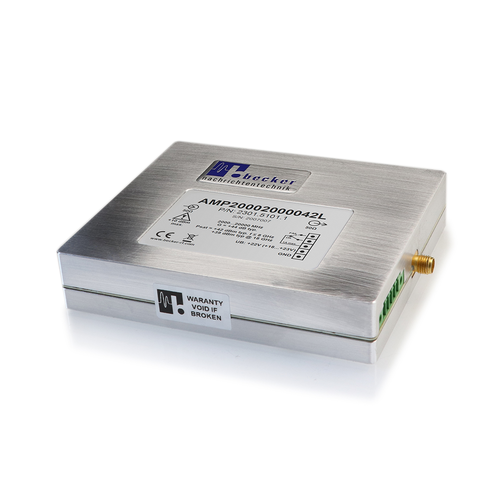AMP20002000042L
AMP20002000042L from Becker Nachrichtentechnik is a compact amplifier module in 50 ohms technology designed for the use in professional applications. The robust electric and mechanic design guarantees operations over a long time. The amplifier works stable over a wide frequency range with many octaves. Internal filters and low noise voltage supplies guarantee high suppression of spurious. To avoid damages during installation, the supply is protected against reverse polarity. The presence of DC power and the module status is indicated by a LED at the module. The health status of the module can also be queried by a floating relay contact for remote operation. The amplifier module is designed for mounting on a heat sink provided by the user for passive cooling.
Cellular, Wi-Fi, Military, R&D 2000 ... 20000 MHz 42 dBm | 15 W
Special Features
Using modern semiconductor technologies gives the amplifier module high dynamic properties over a wide operating bandwidth. Due to the ultra-wide operation frequency range the amplifier is suitable in many cellular, Wi-Fi, research and military applications. An internal self-test function monitors current consumption and module temperature. In the case of exceeding the limits, a floating contact is opened and the status is signalized by the LED at the module.
Tolerant against Mismatches
Using power transistors with enough head room to maximum ratings make the amplifier module robust against reverse power and therefore robust against loads at the output which are not matched.
Rugged Design
The amplifier is housed is a milled aluminium case. This protects the circuit against mechanical damage and gives best shielding towards and from the electromagnetic environment. The standard module is designed for mounting on a heat sink provided by the customer. Alternatively, Becker Nachrichten-technik provides the amplifier with heat sink or even integrated with power supply and active cooling in a 19” 2U housing.
Latest modification: 22.04.2024


